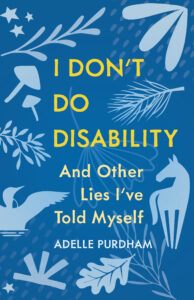“I feel like everything [in my life] is a slow build,” says writer, instructor, parent disability advocate and mom of three, Adelle Purdham (CNF22).

Purdham recently signed a contract with Dundurn Press for her essay collection, I Don’t do Disability and Other Lies I’ve Told Myself, which examines the joys and complexities of raising a daughter with Down Syndrome. The collection, set for release in November 2024, is almost a decade in the making.
In 2015, when her daughter Elyse was still a toddler, Purdham enrolled in Humber College’s creative writing correspondence program. There she began what would become her first full-length manuscript, a memoir about her journey as a young mother receiving a diagnosis of Down Syndrome for her unborn child.
“I felt really strongly about it,” says Purdham. “There wasn’t another memoir written by a young mother who had a baby with Down Syndrome and that was what I was looking for.” But the manuscript, which ultimately saw four different drafts, never found a publisher.
By the time Purdham decided to apply for the King’s MFA program in 2019, she’d decided to take a break from writing about disability, and her program application focused on other projects. But just before classes started, Purdham revisited the idea.
“That’s my ‘heart-work;’ I couldn’t write away from disability,” she says. “I couldn’t not talk about my relationship with my daughter.”
Much of the material from her previous manuscript made its way into the collection of essays, but time has given Purdham a more nuanced view of motherhood and family life, especially as it pertains to parenting a child with a disability.
“This book is different. I thought I was writing my daughter’s story in my first book. Originally I think I was asking this question of ‘What is the value of her life?’ And in I Don’t Do Disability I’m continuing to ask that question, but I’m also asking primarily ‘What is the value of my life as her mother?’”
During the MFA program, Purdham worked with three different mentors, each bestowing a distinct contribution on her essay collection.
Author and essayist Jane Silcott proved a “razor sharp” editor who helped Purdham see the value in her work. ”She has a really nurturing way that makes you feel confident in your writing even as she’s helping you strengthen it.”
Memoirist Cooper Bombardier served as an inspiration through his social justice writing and his “generous” and “big-hearted” mentorship style.
For her final term, Purdham worked with author Ayelet Tsabari, who came at the perfect time, as Purdham was gaining confidence in the shape of her manuscript and its narrative. “I didn’t need to be lifted as much as I did in the beginning in terms of building my confidence. So Ayelet was really good at treating me like a peer and picking out things that weren’t working and just telling me.”
A year and a half after finishing the program, Purdham sent out her manuscript for publication, targeting small and mid-sized Canadian presses. Two weeks later, she received a reply from Megan Beadle, an editor at Dundurn. “In the first line of her email…it was, ‘here’s what I read. I see you.’ And I burst into tears, because she saw me. She understood my work. And I don’t think there’s a better feeling.”
Opting for a collection of essays proved to be advantageous as Purdham steadily developed both her readership and her portfolio throughout the program, one piece at a time. Some of these she submitted for publication or to contests, helping build her audience. One of those essays, “The Giving Tree,” was published in the anthology, Good Mom on Paper (Book*hug Press 2022), while another, “Wild Horses,” was longlisted for the 2023 Canadian Nonfiction Collective-Humber Literary Review contest. “I had some good success and in the end that helped me get noticed, helped me get published…And it was proven in a sense that there was an audience that responded to it.”
For Purdham, who also begins a new role as a part-time creative writing instructor at Trent University in January after having spent years giving workshops in their continuing education department and in the community, the only way to success is a slow and steady process of putting one foot in front of the other.
“It seems like it all happened really fast, but in some ways I think we become ripe as writers,” she says. “It becomes your time. And it becomes your time when you put the work in.”

